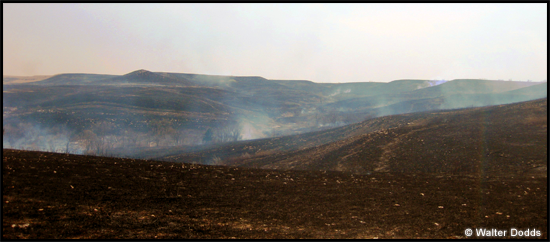The Konza Prairie LTER program is based on a conceptual framework that recognizes fire, grazing, and climatic variability as essential and interactive factors shaping the structure and dynamics of grasslands across landscape mosaics. Our LTER goals are to test specific hypotheses regarding the independent and interactive ecological effects of these factors in mesic grasslands, and to evaluate the potential consequences of multiple global change phenomena. Our research program is also designed to elucidate the role of biotic interactions (competition, mutualism, predation, herbivory) in grassland communities and ecosystems, and provide insight into more general ecological phenomenon with applicability to multiple ecological systems. Links under the research tab above provide further information about our "core" LTER research activities, and a variety of other related studies underway at the Konza Prairie LTER site. More detailed information is also available in the most recent of our LTER proposal.

Our current LTER VI goals are to: (1) continue core long-term experiments focused on responses to land-use and climatic variability, with the addition of new treatments and response variables; (2) expand studies of woody plant encroachment into grasslands, a critical land-cover change, to include new consumer and ecosystem responses and add new paleoecological perspectives; (3) assess rates and trajectories of change during restoration of grasslands, an increasingly important land use; (4) expand climate change studies; (5) continue and expand long-term studies of nutrient enrichment and interactions with land-use practices, with new emphasis on linking above- and belowground responses; (6) initiate new studies on the consequences of altered nutrient regimes for streams, and on linkages between terrestrial land-cover change and streams; and (7) use KNZ data to support regional ecological studies and place our research in the context of regional socio-ecological systems. New studies during LTER VI will examine the mechanisms driving trajectories and rates of biotic responses to environmental change, including human responses to these changes (e.g., conservation and restoration). Finally, we will continue to use LTER data to promote formal integration and synthesis to advance ecological understanding of this and other ecosystems, which will advance basic ecological knowledge and address issues of societal importance.